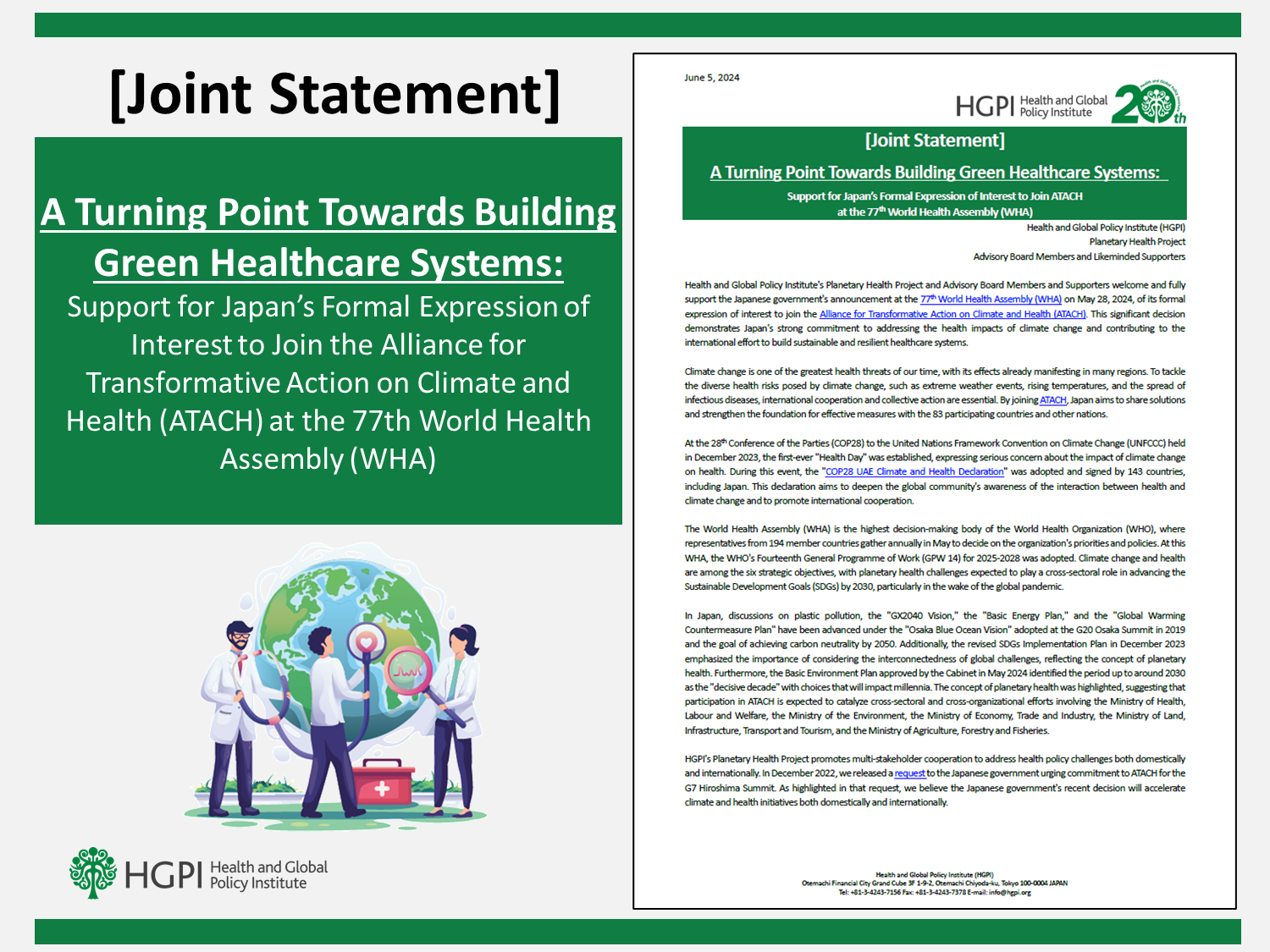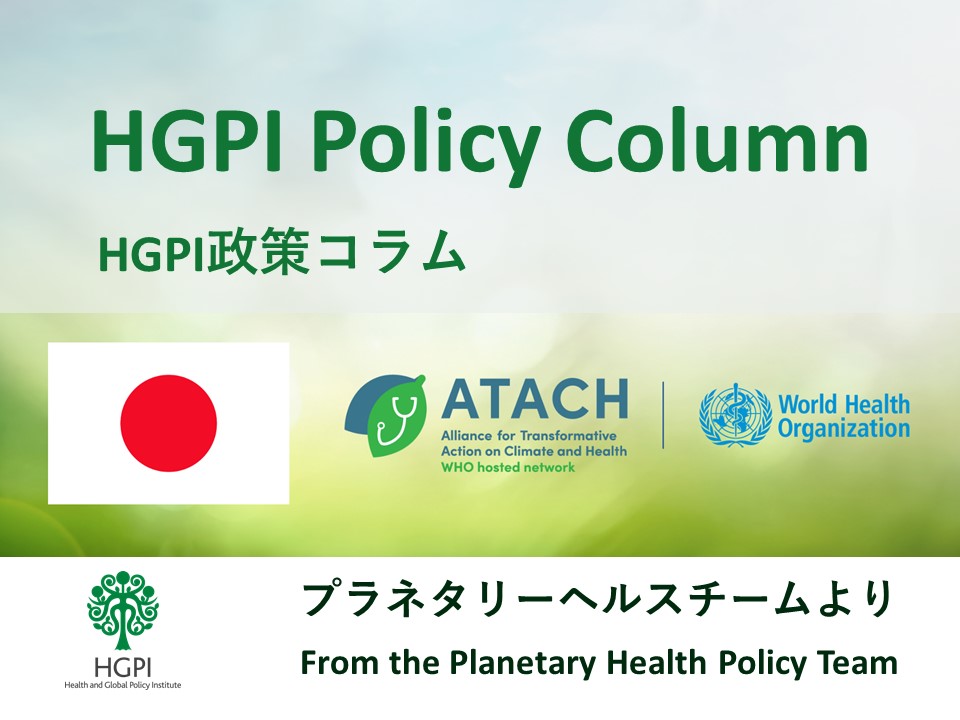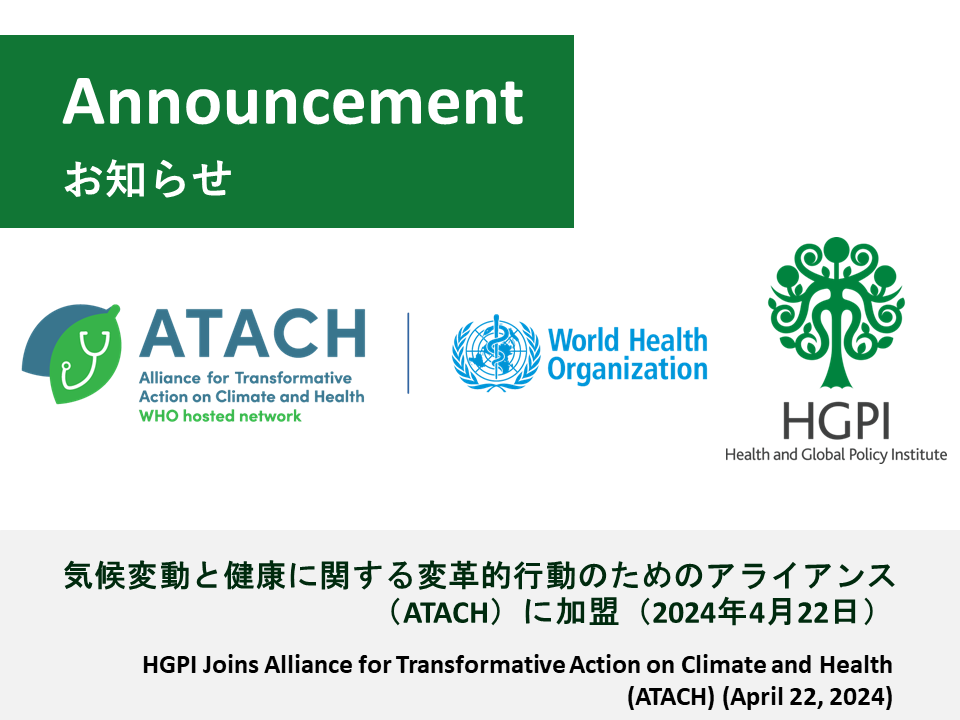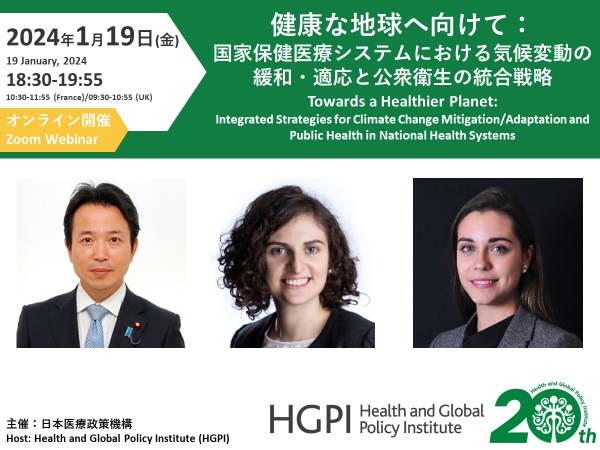[Policy Recommendations] Developing a National Health and Climate Strategy for Japan (June 26, 2024)
date : 6/26/2024
Tags: Planetary Health
![[Policy Recommendations] Developing a National Health and Climate Strategy for Japan (June 26, 2024)](https://hgpi.org/en/wp-content/uploads/sites/2/NHCSJ_ENG.png)
Health and Global Policy Institute (HGPI) Planetary Health Project has released a policy recommendation titled “Developing a National Health and Climate Strategy for Japan: Recommendations for Building a Climate Resilient, Decarbonized Health System” This policy recommendation outlines specific measures for enhancing the resilience of Japan’s healthcare system to climate change, transitioning to decarbonization, and increasing sustainability.
Climate change, a key planetary health issue, is the greatest public health challenge of the 21st century. It refers to long-term changes in temperature and weather patterns, primarily caused by human activities that lead to greenhouse gas (GHG) emissions. The Japanese government has initiatives such as the GX Implementation Council, the GX National Strategy, the Basic Energy Plan, and the Plan for Global Warming Countermeasures in place to achieve carbon neutrality by 2050. Considering the environmental impact from the healthcare sector, it is crucial to present a roadmap to protect both human and environmental health.
In preparing this proposal, we determined the items to be included through discussions with experts who joined the Expert Panel. We also reviewed pioneering efforts from several countries around the world. Particularly, experts involved in national climate action strategies in the UK and France provided invaluable insights. They introduced their innovative national strategies for climate change mitigation and adaptation in public health through online seminars.
Additionally, we collaborated with academic institutions, healthcare professionals, policymakers, and civil society members participating in the Planetary Health Project. We incorporated their feedback on the draft to ensure that Japan’s healthcare system becomes more resilient to climate change, transitions to decarbonization, and enhances sustainability. This comprehensive approach helped us deepen our discussions and finalize the proposal.
The national strategy adaptation includes adaptation and mitigation measures, with the following four objectives and five principles.
[Objectives]
- Build a climate resilient health system and enhance its capacity to protect health and wellbeing for people living in Japan from the adverse effects of climate change
- Provide high-quality, equitable health services that are tailored to communities and cultures while supporting the ability of health services and communities to function as normal despite a changing climate
- Provide high-quality, equitable health services that are tailored to communities and cultures while supporting the ability of health services and communities to function as normal despite a changing climate
- Create a health system with net-zero GHG emissions through the supply chain and that contributes to achieving carbon neutrality by 2050
- Minimize the health system’s environmental impact and achieve the Government’s emission reduction target of net zero by 2050
- Minimize the health system’s environmental impact and achieve the Government’s emission reduction target of net zero by 2050
- Advance global cooperation in building climate resilient and sustainable health systems and societies
- Make full use of resources such as the National Institute for Environmental Studies (NIES) Climate Change Adaptation Information Platform (A-PLAT) and promote efforts to expand scientific knowledge on climate risks, to utilize support tools, and to strengthen adaptation capacity together with other countries and related organizations
- Seek opportunities to share scientific knowledge from Japan, contribute to the development of international standards, and cooperate with neighboring countries to promote better health by addressing climate change
- Recognize that health and climate change are interrelated and support the creation of healthy, climate resilient, and sustainable communities through whole-of-government action
- Using an approach that prioritizes health in all policies, promote the health co-benefits of reducing GHG emission throughout society
[Principles]
- Placing the concept of planetary health at the foundation
- While thinking of the health of the global ecosystem and the health of people and human society, their interdependent nature must be clarified and research and implementation measures that humanity can use to ensure sustainability through the sound management of nature must be pursued.
- While thinking of the health of the global ecosystem and the health of people and human society, their interdependent nature must be clarified and research and implementation measures that humanity can use to ensure sustainability through the sound management of nature must be pursued.
- Emphasizing public health through health promotion and disease prevention for the population
- Public health promotion and disease prevention are fundamental principles of mitigation and adaptation throughout these strategies. These items are to be given strong support at all stages, from primary to tertiary prevention, by taking environmental and social determinants of health into account.
- Climate-driven changes in the environment and human-social systems will be viewed in terms of environmental and social determinants of health.
- Prevention of new diseases and exacerbation of chronic diseases through appropriate prevention measures will reduce GHG emissions and produce health co-benefits by lowering healthcare demand.
- Adhering to evidence-based policymaking (EBPM)
- Climate change policies should be based on the latest scientific knowledge and make maximum use of available data and evidence. In areas where clear evidence has yet to be established, policymaking should be conducted with caution.
- Research on the health impacts of climate change as well as the impacts of health system activities on public health and society should both be advanced. Findings from both should be reflected in policymaking.
- Guaranteeing opportunities for people to enjoy good health and ensure health equity
- Equal opportunities to enjoy good health should be guaranteed for everyone, and every person should have opportunities to enjoy the best physical and mental health they can possibly attain.
- Consideration must be given to senior citizens, children, people with chronic non-communicable diseases, people with mental disorders, and other climate vulnerable groups so they can enjoy the same health benefits as healthy people.
- Harmonizing with the traditional view of nature in Japanese culture
- The traditional Japanese view of nature is based on the premise that humans must revere and coexist with nature and is characterized by an ambiguous distinction between humans and nature, an emphasis on natural and seasonal transitions and cycles, and a non-linear, cyclical view of time and events.
- While understanding and interpreting the concept of planetary health, policymaking should be carried out with care to formulate policies that are consistent with the distinctive Japanese view of the relationship between humans and nature.
We hope this policy recommendation will help policymakers and stakeholders in advancing policies to address planetary health issues.
For more detailed information, please refer to the PDF file at the bottom of this page.
Expert Panel (titles omitted; in Japanese syllabary order; affiliation and title at the time of participation)
Taiko Kudo (Chief Engineer, Environment and Energy Division, Japan Weather Association)
Keisuke Nansai (Head, Material Cycles Division, National Institute for Environmental Studies (NIES))
Masahiro Hashizume (Professor, Department of Global Health Policy, Graduate School of Medicine, The University of Tokyo)
Chiho Watanabe (Dean, Interfaculty Initiative in Planetary Health; Professor, School of Tropical Medicine and Global Health, Nagasaki University)
Planetary Health Project Advisory Board (titles omitted; in Japanese syllabary order; affiliation and title at the time of participation)
Satoru Arima (DAIICHI SANKYO HEALTHCARE CO., LTD.)
Saori Kashima (Director, Center for the Planetary Health and Innovation Science (PHIS), Associate Professor of Environmental Health Sciences Laboratory, Graduate School of Advanced Science and Engineering, Hiroshima University)
Masahiro Kaminota (Director-General, Environmental Health Department, Minister’s Secretariat, Ministry of the Environment)
Taiko Kudo (Chief Engineer, Environment and Energy Division, Japan Weather Association)
Naoki Kondo (Professor and Chair, Department of Social Epidemiology, Graduate School of Medicine and School of Public Health, Kyoto University)
So Sugawara (Representative Director, Green innovation)
Yasuhiko Suzuki (Director, International Joint Research Institute for Zoonosis Control, Hokkaido University; Distinguished Professor, Hokkaido University)
Yukari Nakano (Executive Officer, Japanese Nursing Association)
Keiko Nakamura (Professor, Department of Global Health Entrepreneurship, Graduate School of Medical and Dental Sciences (Medicine), Tokyo Medical and Dental University)
Keisuke Nansai (Head, Material Cycles Division of National Institute for Environmental Studies (NIES))
Yosuke Nishiba (Public Affairs and Sustainability Department, Market Access & External Affairs Division, Novo Nordisk Pharma Ltd.)
Masahiro Hashizume (Professor, Department of Global Health Policy, Graduate School of Medicine, The University of Tokyo)
Makoto Haraguchi (Fellow, MS&AD InterRisk Research & Consulting, Inc. / TNFD dedicated SVP, MS&AD Insurance Group Holdings, Inc.)
Eiji Hinoshita (Assistant Minister for Global Health and Welfare, Ministry of Health, Labour and Welfare)
Kenji Fuma (Specially Appointed Professor, Co-Creative Organization for Green Society, Shinshu University / CEO, Neural, Inc.)
Hidekazu Hosokawa (Executive Director, Japan Medical Association)
Yusuke Matsuo (Director, Business Task Force, Institute for Global Environmental Strategies)
Yutaka Mitsutake (Director, Japan Sustainability, AstraZeneca K.K.)
Hiroya Yamano (Director, Biodiversity Division, National Institute for Environmental Studies)
Naoko Yamamoto (Professor, International University of Health and Welfare / Director, Global Medical Cooperation Center)
Chiho Watanabe (Dean, Interfaculty Initiative in Planetary Health; Professor, School of Tropical Medicine and Global Health, Nagasaki University)
Japan Association for Global Health, Students Section (jagh-s)
Asian Medical Students’ Association Japan (AMSA Japan)
Top Research & Recommendations Posts
- [Policy Recommendations] The Path to a Sustainable Healthcare System: Three Key Objectives for Public Deliberation (January 22, 2026)
- [Research Report] Perceptions, Knowledge, Actions and Perspectives of Healthcare Organizations in Japan in Relation to Climate Change and Health: A Cross-Sectional Study (November 13, 2025)
- [Research Report] The 2025 Public Opinion Survey on Healthcare in Japan (March 17, 2025)
- [Policy Recommendations] Reshaping Japan’s Immunization Policy for Life Course Coverage and Vaccine Equity: Challenges and Prospects for an Era of Prevention and Health Promotion (April 25, 2025)
- [Research Report] The 2023 Public Opinion Survey on Satisfaction in Healthcare in Japan and Healthcare Applications of Generative AI (January 11, 2024)
- [Research Report] AMR Policy Update #4: Cancer Care and AMR (Part 1)
- [Policy Recommendations] Developing a National Health and Climate Strategy for Japan (June 26, 2024)
- [Public Comment Submission] “Assessment Report on Climate Change Impacts in Japan (Draft Overview)” (December 24, 2025)
- [Research Report] The Public Opinion Survey on Child-Rearing in Modern Japan (Final Report) (March 4, 2022)
- [Research Report] Survey of Japanese Physicians Regarding Climate Change and Health (December 3, 2023)
Featured Posts
-
2026-01-09
[Registration Open] (Hybrid Format) Dementia Project FY2025 Initiative Concluding Symposium “The Future of Dementia Policy Surrounding Families and Others Who Care for People with Dementia” (March 9, 2026)
![[Registration Open] (Hybrid Format) Dementia Project FY2025 Initiative Concluding Symposium “The Future of Dementia Policy Surrounding Families and Others Who Care for People with Dementia” (March 9, 2026)](https://hgpi.org/en/wp-content/uploads/sites/2/dementia-20260309-top.png)
-
2026-02-05
[Registration Open] (Webinar) The 141st HGPI Seminar “Current Status and Future Prospects of Korea’s Obesity Policy: Voices of People with Lived Experience in Policy Promotion” (March 3, 2026)
![[Registration Open] (Webinar) The 141st HGPI Seminar “Current Status and Future Prospects of Korea’s Obesity Policy: Voices of People with Lived Experience in Policy Promotion” (March 3, 2026)](https://hgpi.org/en/wp-content/uploads/sites/2/hs141-top-1.png)
-
2026-02-06
[Research Report] AMR Policy Update #5: Cancer Care and AMR (Part 2)
![[Research Report] AMR Policy Update #5: Cancer Care and AMR (Part 2)](https://hgpi.org/en/wp-content/uploads/sites/2/HGPI_20260204_AMR-Policy-Update-5.png)








